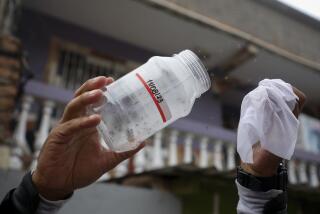Open-Air Use of Genetically Engineered Bacteria OKd
- Share via
WASHINGTON — The Environmental Protection Agency on Thursday approved the first open-air use of genetically engineered bacteria, permitting a California firm to test bacteria that appear to protect plants from frost. The decision was immediately challenged in court.
Advanced Genetic Sciences of Oakland plans to spray the bacteria on a small plot of strawberry plants near Salinas in late December or January to test whether the material will prevent frost at temperatures down to 23 degrees Fahrenheit.
The EPA decision has long been anticipated by other genetic engineering firms that hope to cash in on a potentially lucrative biotechnology market.
Hazards Discounted
Announcing federal approval of the controversial experiment, Jack Moore, EPA assistant administrator for pesticides and toxic substances, said the products are “very unlikely to pose unreasonable hazards to man or the environment.”
But critics immediately lashed out at the decision, charging that the EPA had failed to sufficiently gauge the test’s likely effect on the environment. Several expressed fear that the new bacteria could float into the atmosphere and alter frost formation in clouds, thus changing weather patterns and the ecological balance.
Jeremy Rifkin, an environmentalist who has gone to court to block similar experiments, filed suit in U.S. District Court in Washington hours after the EPA’s announcement, charging the decision is “capricious and arbitrary.”
Studies Called Incomplete
Rifkin, president of the Foundation on Economic Trends, asked the court to block the release because the EPA has not completed studies that would allow it to evaluate the environmental impact of the experiment.
In Oakland, Douglas J. Sarojak, a biologist who is director of marketing and product development for Advanced Genetic Sciences, said the firm is going ahead with its plans. “We hope that science and reason will prevail,” he said.
Earlier, during a hearing on Capitol Hill, Rifkin lambasted the “precedent” the EPA action will set for “thousands of potential products being introduced into this environment” in the future.
Michael Fox, scientific director of the Humane Society of the United States, said the decision “reflects the naivete of the Reagan Administration,” adding that there is “nothing to stop the spread of the new genetic trait to other bacteria, which could affect the growth cycles of other plants.”
However, EPA officials said extensive data from government scientists and public comments showed the experiments pose no such hazards.
Moore told a news conference that while the EPA did not conduct its own tests to tell whether the bacteria could affect frost formation in clouds, it will require “air monitoring of the test site” to determine how much bacteria will be released.
Remove Genetic Material
Advanced Genetic Sciences plans to take two naturally occurring bacteria-- Pseudonomas syringae and Pseudonomas fluorescens-- and to remove the genetic material that instructs the bacteria to produce an ice-forming protein.
Then, the genetically altered bacteria will be sprayed on the blossoms of 2,400 plants in a test plot surrounded by a “buffer zone” of bare soil. The company hopes the new bacteria will dominate the unaltered frost-producing bacteria, thus blocking the formation of ice crystals.
Such technology could be used on a variety of other crops worldwide, scientists theorize, extending the growing seasons for crops and preventing huge losses resulting from frozen plants. The profit to Advanced Genetic Sciences alone will amount to “millions of dollars,” Sarojak said.
The experiment focuses new attention on the government’s role in monitoring genetic experiments, as Administration officials defended their efforts at a hearing before the congressional Environmental and Energy Study Conference.
Officials from the Departments of Health and Human Services and Agriculture and from the National Science Foundation said a planned interagency group called the Biotechnology Science Coordinating Committee will effectively monitor the experiments.
But Sen. Albert Gore Jr. (D-Tenn.), vice chairman of the conference, criticized the group as “toothless, just a discussion group.”
More to Read
Sign up for Essential California
The most important California stories and recommendations in your inbox every morning.
You may occasionally receive promotional content from the Los Angeles Times.













